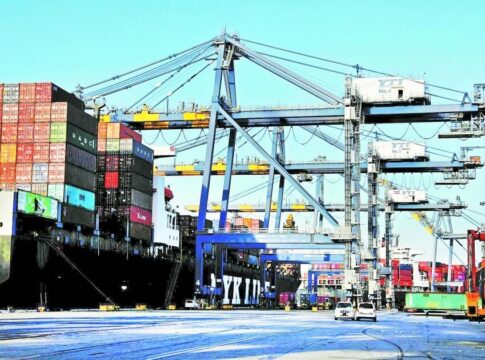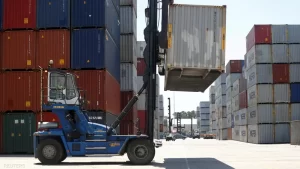Early Tuesday morning, dockworkers across ports from Maine to Texas commenced picketing, striking over wages and automation. This labor action could potentially re-spark inflation and lead to product shortages if it extends beyond a few weeks, and it has several implications for the Middle East.
The contract between the ports and the International Longshoremen’s Association, representing around 45,000 workers, expired at midnight. Despite noted progress in Monday’s talks, the strike, which affects 36 ports, proceeded, marking the union’s first strike since 1977.
In Philadelphia, workers started picketing shortly after midnight, circling a rail crossing near the port while chanting “No work without a fair contract.” The union’s message emphasized their stance against job automation, with signs reading, “Automation Hurts Families: ILA Stands For Job Protection.”
Boise Butler, the local ILA president, emphasized that workers are seeking a fair contract that secures their jobs against automation. He pointed out that shipping companies profited significantly during the pandemic by imposing high prices. “Now we want them to pay back. They’re going to pay back,” Butler remarked, indicating the union’s readiness to strike as long as necessary to secure a fair deal, leveraging their crucial role in the national economy.
At Port Houston, at least 50 workers struck at midnight, holding signs advocating for a fair contract.
The U.S. Maritime Alliance, representing the ports, stated on Monday evening that both parties had revised their wage proposals but hadn’t reached an agreement. The union’s initial proposal included a 77% pay increase over six years, citing inflation and past modest raises. While some ILA members earn a base salary of $81,000 per year, others make over $200,000 with overtime.
The alliance responded with an offer of a 50% raise over six years and agreed to maintain existing automation limits. However, the union seeks a total ban on automation. The extent of the gap between the two sides remains uncertain.
Despite the alliance’s latest offer, the union rejected it early Tuesday, stating that it didn’t meet the demands for wages and automation protections. Formal negotiations hadn’t occurred since June.
“We are prepared to fight as long as necessary, to stay out on strike for whatever period it takes, to get the wages and protections against automation our ILA members deserve,” said Union President Harold Daggett. “They must now meet our demands for this strike to end.”
The alliance noted that their offer included tripled contributions to retirement plans and enhanced health care options.
Short-Term Impacts on the Middle East:
Supply chain experts predict that while the immediate impact on Middle Eastern consumers might be minimal due to pre-emptive stocking by retailers, a prolonged strike could disrupt the supply chain significantly, leading to higher prices and delays in goods delivery. This could affect the cost of imported goods, impacting local markets and potentially increasing the cost of living.
Long-Term Impacts on the Middle East:
If the strike extends, businesses in the Middle East might face higher shipping costs due to delays, which could be passed on to consumers. This could result in inflationary pressures in the region. Additionally, the Middle Eastern ports may experience increased traffic as companies seek alternative shipping routes, which could strain local logistics and infrastructure.
The strike also underscores the global interconnectedness of supply chains, highlighting the Middle East’s vulnerability to labor disputes in distant regions. This may prompt regional policymakers to consider diversifying their supply chains and investing in local production capabilities to mitigate such risks in the future.
J.P. Morgan estimated that a port shutdown on the East and Gulf Coasts could cost the U.S. economy between $3.8 billion and $4.5 billion daily, with partial recovery expected post-strike. The economic ripple effects of such losses could extend to the Middle East, particularly in countries with strong trade ties to the U.S.
Political Implications:
With the presidential election approaching, the strike could influence voter sentiment if it leads to shortages. Various industries, including retailers and auto parts suppliers, had hoped for a resolution or presidential intervention via the Taft-Hartley Act to mandate an 80-day cooling-off period.
However, in a Sunday interaction with reporters, President Joe Biden, who has been courting union support, stated he had no plans to intervene in the potential work stoppage.
On Monday, a White House official mentioned that Biden had directed his administration to maintain regular communication with the ILA and the alliance to facilitate ongoing negotiations. The President instructed Chief of Staff Jeff Zients and National Economic Council Director Lael Brainard to convene the alliance’s board on Monday afternoon, urging a fair and swift resolution that acknowledges both the shipping companies’ recent successes and the union workers’ contributions.
In conclusion, while the immediate impact of the dockworkers’ strike on the Middle East may be limited, prolonged disruptions could have significant economic and logistical repercussions. Regional stakeholders must stay vigilant and consider strategies to mitigate potential adverse effects on their economies.



